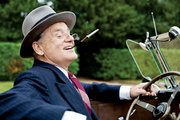It must be the turn of the year, because presidents are starting to show up in theaters, first in Steven Spielberg’s Lincoln (doing well there despite historical precedent) and now in Roger Michell’s Franklin Roosevelt biography Hyde Park on Hudson. It seems like the presidents always come out when it’s time for the serious Oscar contenders.
Yet, for all its charm, its gorgeous detail and its fine performances, I don’t know that Hyde Park is going to be one of those. Maybe for Bill Murray as FDR. Lord, would I love to see that, and I don’t know that it’s entirely undeserved. I mean, going in I worried I wouldn’t be able to look past Murray and see the 32nd president, but despite his legendary comedic acumen, Murray shows again he can be uncanny in drama roles, too.
But I just don’t think this is a film with enough umph to pull off a golden statue. And I don’t just mean that it’s understated, though it is. I mean it sort of tells a story for a long time with no real destination in mind.
Not that it’s a bad story. It’s a chronicle of the, uh, “special friendship” between Roosevelt and his distant cousin (fifth or sixth, depending on the counting) Margaret “Daisy” Suckley (Laura Linney). Yes, that means what you think it means. The deal is that FDR spent a lot of time at the family’s New York estate, his “summer White House,” in Hyde Park. And there he called on this cousin at first only to take his mind off work, but it eventually got more serious.
And the backdrop here is a pretty grand stage. Though the film takes its time getting there, the budding relationship only barely precedes a visit from King George VI and Queen Elizabeth of the United Kingdom. Yes, the one with the stutter from The King’s Speech. It’s the first visit of British royals to the United States, and much of the film focuses on the to-do of their arrival, how they’ll perceive America and how they’ll be perceived by Americans. But the stakes here couldn’t be higher: the king has come to ask for aid in what’s already become an inevitable conflict with Germany. We’d later call that World War II.
Yet, with such enormous events behind it, Michell makes the film, written by Richard Nelson, very much about the human scale, and that’s truly where it excels. There is, of course, the FDR and Suckley relationship. And there is that of the king and queen, trying to be a husband and wife and yet so much more to their country and, indeed, the rest of the world. Their scenes, as it happens, may well be among the best in the film.
That’s because the ultimate message is a human one. A voiceover epilogue makes the point plain, that people have secrets, which in this era of the ever-present camera, where phones will always be on hand to record every gaffe, seems almost charming and quaint. But people are people. An elected president, for all his power and authority, may be crippled by indiscretion or (worse?) by polio, just as a king must by nature of heredity command respect even though his personal failings stand to make him a subject of mockery in comparison to his older brother, the what-if king who might have been. Secrets make us who we are — no matter who we are.
Unfortunately, the film takes the better part of its 95-minute runtime to get to this conclusion. Not that it’s a long wait, but the pacing doesn’t make it as brisk as it might be. The director is clearly a fan of the solitary thinking shot and landscapes, and both tend to slow things down when they might not necessarily need to be stalled.
Still, there’s an interesting tale here, well acted, and it does have some deeper thinking behind it. It might not be worthy of Oscar gold, but it’s worth taking in nonetheless.
